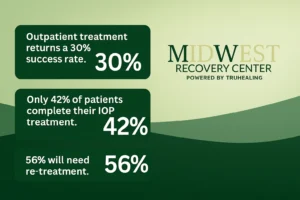You’ve been here before.
Maybe you did the 30-day residential program. Or showed up to a few IOP sessions. Maybe you white-knuckled through some sober time and tried to talk yourself into feeling better.
But when the holidays roll around—same old feelings, same old emptiness. People expect cheer. You feel flat. Numb. Pretending again.
It’s not that you haven’t tried. It’s that what you tried wasn’t the right fit. If you’re someone who’s thinking, “Treatment didn’t work,” maybe it’s time to ask a different question:
What if the treatment you had… wasn’t enough?
That’s where a Partial Hospitalization Program (PHP) comes in. Not as a last resort. But as a serious re-start.
You’ve Been Through the Motions—But Nothing Changed
You did the worksheets. You sat through group. You detoxed. You followed the rules.
But nothing felt real. You left still wondering: “When does this get better?”
That’s the part most programs don’t talk about. The disconnect between “technically sober” and actually living. That awkward space where people expect you to celebrate your progress… and you’re still wondering who you are.
You don’t need another cycle of doing-what-you’re-supposed-to. You need a chance to rewire how you experience life. PHP gives you that space.
What Makes a Partial Hospitalization Program Different?
Most treatment options fall into two buckets:
- Residential/Inpatient: full-time, 24/7 care, completely removed from your daily life
- Outpatient/IOP: part-time sessions a few days a week, minimal disruption to work/life
But what if neither is working?
Partial Hospitalization sits right in between. You don’t check out of life, but you also don’t have to manage it all while recovering.
In PHP, you attend treatment for several hours a day, multiple days a week—while living at home or in a supported environment. You get:
- Consistent therapeutic support
- Medical oversight, if needed
- Group therapy with real-time reflection
- Structured daily rhythms
- Enough time to slow down
- Enough life-space to practice what you’re learning
This isn’t just “more therapy”—it’s real reprogramming.
The Numbness You Feel Isn’t Failure
If the holidays make you feel hollow, you’re not broken. You’re worn out.
People in early or failed recovery often carry two emotions:
- Resentment toward the process (“I tried and it didn’t work.”)
- Shame about trying again (“People think I should be further along.”)
But here’s the truth: numbness is often the brain’s last defense against emotional burnout. It’s not a flaw—it’s a flag. It means you’re ready for something different.
PHP doesn’t ask you to be hopeful. It just asks you to be honest.

You’re Allowed to Be Skeptical and Still Show Up
You don’t need to “believe in the process” to walk through the door.
Plenty of people start PHP with crossed arms and low expectations. Some come back after multiple treatment attempts. Some come with zero trust left.
That’s okay.
You don’t need to commit to being a brand-new person. You just need to commit to showing up—even if that means sitting in the corner, uncertain.
You’re allowed to be unsure. We’ll meet you there.
Why PHP Works When Other Programs Don’t
Here’s what we hear from clients who’ve been through it:
“Outpatient was fine, but I still had to go back to work every day. I didn’t have space to feel.”
“I was always ‘holding it together.’ PHP gave me permission to not fake it.”
“It was the first time I felt like the day was structured for me, not around me.”
They’re not saying PHP is perfect. But for many, it’s the first time treatment feels real—not rehearsed.
A Holiday Season That Doesn’t Feel Like Survival
Most people in relapse cycles dread this time of year.
The holidays come with family expectations, social pressure, loneliness, grief, and memories. And if you’ve been in and out of treatment before, this time of year can feel like a spotlight on everything that hasn’t changed.
PHP can offer something different:
- Structure during the chaos
- Accountability during isolation
- Emotional tools before the spiral
- Daily rhythm instead of weekly whiplash
This year, you don’t need to white-knuckle through December and hope you’re okay by January. You can start now—on purpose.
What to Expect in a Partial Hospitalization Program
You’ll be in treatment several days a week, usually five. Each day includes:
- Group therapy sessions
- One-on-one counseling
- Skills-based recovery work
- Psychoeducation (understanding the “why” behind what you feel)
- Reflection time and emotional processing
You’ll go home at night—but you won’t feel like you’re “on your own.” The days are immersive enough to support change. The evenings are open enough to live your life.
And as you grow, your program will shift with you.
FAQs: Straight Answers for the Treatment Skeptic
Do I have to believe PHP will work for it to work?
No. You just have to participate. Many clients arrive with doubts and still experience deep breakthroughs.
What if I’m not in a crisis? Can I still join?
Yes. PHP isn’t just for emergencies. It’s for people who want to avoid going back into crisis—or who never got the full recovery they needed.
Is this residential?
No. PHP is non-residential. You live at home or in safe housing and attend treatment during the day.
How long does PHP last?
It depends. Most programs last several weeks. We assess your progress regularly and adjust care as needed.
What happens after PHP?
We help you step down into IOP or outpatient care. We also build a long-term recovery plan with you—not for you.
If You’ve Been Stuck, You Deserve to Start Again
This isn’t your fault.
Trying a few programs and not getting what you needed doesn’t mean you’re resistant. It means the system didn’t meet you where you were.
You don’t need to wait for rock bottom to start again. You just need to want something different than autopilot.
PHP can be that difference.
And if you’re in Toledo, or nearby in communities like Maumee, Youngstown, or Oregon, Ohio—we’re ready when you are.
Let’s Make This Holiday Feel Different—for Real
At Midwest Recovery Center, we know what it’s like to feel treatment fatigue. To be wary. To wonder if anything will ever actually work.
A Partial Hospitalization Program may be the step that connects structure with self. That bridges survival with real, sustainable change.
Call (888) 657‑0858 or visit our Partial Hospitalization Program page to learn more.
You don’t have to “try harder.” You just have to try differently.


























